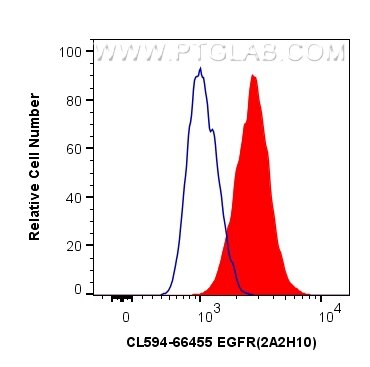- Featured Product
- KD/KO Validated
CoraLite®594-conjugated EGFR Monoclonal antibody
EGFR Monoclonal Antibody for FC (Intra)
Host / Isotype
Mouse / IgG1
Reactivity
human
Applications
FC (Intra)
Conjugate
CoraLite®594 Fluorescent Dye
CloneNo.
2A2H10
Cat no : CL594-66455
Synonyms
Validation Data Gallery
Tested Applications
| Positive FC detected in | A431 cells |
Recommended dilution
| Application | Dilution |
|---|---|
| Flow Cytometry (FC) | FC : 0.40 ug per 10^6 cells in a 100 µl suspension |
| Sample-dependent, check data in validation data gallery | |
Product Information
CL594-66455 targets EGFR in FC (Intra) applications and shows reactivity with human samples.
| Tested Reactivity | human |
| Host / Isotype | Mouse / IgG1 |
| Class | Monoclonal |
| Type | Antibody |
| Immunogen | EGFR fusion protein Ag24947 相同性解析による交差性が予測される生物種 |
| Full Name | epidermal growth factor receptor (erythroblastic leukemia viral (v-erb-b) oncogene homolog, avian) |
| Calculated molecular weight | 1210 aa, 134 kDa |
| Observed molecular weight | 145-165 kDa |
| GenBank accession number | BC094761 |
| Gene symbol | EGFR |
| Gene ID (NCBI) | 1956 |
| Conjugate | CoraLite®594 Fluorescent Dye |
| Excitation/Emission maxima wavelengths | 588 nm / 604 nm |
| Form | Liquid |
| Purification Method | Protein G purification |
| Storage Buffer | PBS with 50% Glycerol, 0.05% Proclin300, 0.5% BSA, pH 7.3. |
| Storage Conditions | Store at -20°C. Avoid exposure to light. Stable for one year after shipment. Aliquoting is unnecessary for -20oC storage. |
Background Information
EGFR, also named as ERBB1, is a cell-surface receptor for members of the epidermal growth factor family (EGF-family) of extracellular protein ligands. Binding of the protein to a ligand induces receptor dimerization and tyrosine autophosphorylation and leads to cell proliferation. The gene resides on chromosome 7p12, encoding a 170 kDa membrane-associated glycoprotein. Recent studies have shown EGFR plays a critical role in cancer development and progression, including cell proliferation, apoptosis, angiogenesis, and metastatic spread. Mutations in this gene are associated with lung cancer.
Protocols
| Product Specific Protocols | |
|---|---|
| FC protocol for CL594 EGFR antibody CL594-66455 | Download protocol |
| Standard Protocols | |
|---|---|
| Click here to view our Standard Protocols |


